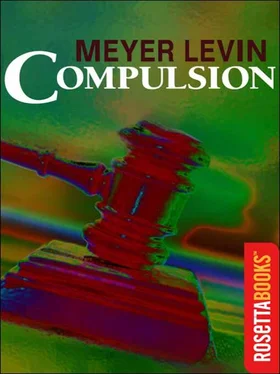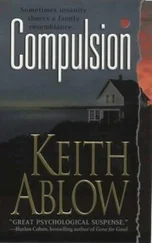“In fact, you have been almost fully occupied testifying for the courts?”
Stauffer admitted that he was in considerable demand by the State.
“And what is your usual fee?” Wilk wrung out of him that it was fifty dollars per day. “And what are you receiving in this case?” It was “the same as all the others, two hundred and fifty.”
Wasn’t it a fact that he had refused to testify unless he received this raise?
Horn was livid. Angrily, Stauffer replied, “Why shouldn’t I get the same as the others?”
Just as angrily, and just as hopelessly put in the wrong, he declared that he didn’t need more than two hours to make an examination. And as for the examination taking place in a crowded room, no matter!
“You heard Dr. Ball state that the conditions and the time limit permitted only the beginning of an examination. Do you disagree?”
Dr. Stauffer shrugged. He had every respect for Dr. Ball, but his own experience with criminals was far more extensive, so he could see through them more readily. “Nobody from the defence had got to them as yet, to tell them what not to say!”
“Exactly!” Wilk roared. “They were without defence, without help, and for two hours you could do as you pleased with them.”
“Two minutes would be enough to see through those smart alecks!”
Wilk picked up a text book. Had Dr. Stauffer studied in Germany?
Yes.
Did he recognize Dr. Bleuler as an authority on nervous disorders?
Dr. Stauffer granted that Dr. Bleuler was a man of high reputation.
Wilk read, “‘A negative finding without prolonged observation never proves a patient to be normal.’” Did Dr. Stauffer agree with that statement?
Stauffer snorted. As a matter of fact, he had observed the criminals right here in court, day after day. They were perfectly oriented.
Wilk read another passage from Bleuler. “‘To suppose that people are well mentally because they are oriented in time, space, and presence is just as naïve as to suppose a person is well mentally because he is not a raving maniac.’”
If they were mentally sick, Dr. Stauffer retorted, then they certainly had a good time with their supposed illness, sitting there laughing.
And didn’t that demonstrate their emotional deficiency?
“No,” said Stauffer. “It shows they’re heartless killers, that’s all.”
“Heartless killers,” Wilk repeated. “But not professional killers who dishonour science by dragging smut into court, and who get paid for perjury, are they?”
Horn roared for an apology. Wilk muttered something to the judge and stalked away from the witness with a trivial wave of the hand.
He had obtained his effect, annihilating Stauffer with contempt, just as he had beguiled Dr. Ball with chummy flattery.
And on the following day, Wilk produced still a third style of cross-examination, to the discomfiture of Horn’s final expert witness.
For Dr. Tierney, Wilk exhibited a clear, persistent, dry method of questioning and an utter mastery of his material, so that the entire courtroom could not but relish his playing of a highly aware and resistant witness, until the lawyer got the doctor to say everything he wanted him to say.
Tierney was a local man of national stature, whom Horn had used to tally against Dr. McNarry. He had been director of the State Hospital for the Insane, and he was, like Dr. McNarry, the author of an important work on insanity and the law. A most impressive figure, dark-haired, wearing heavy horn-rimmed glasses.
For Horn, he confirmed that he had studied the Storrs-Allwin report and that he had studied the behaviour of the defendants during all these weeks in court. Both were in full possession of their faculties, and sane.
Wilk began, “Could you tell by looking at these boys whether or not they were mentally diseased?”
“No,” the doctor responded. “But I could tell whether or not their appearance showed evidence of mental disease.”
There was a suppressed snort from Judd at the fatuous remark.
Wilk then sought to show that Dr. Tierney had never even talked to the defendants. The doctor had seen them a day after the famous Sunday examination. They had been brought to Horn’s office, to pick up suitcases sent by their families.
“And did you examine these boys then? Did you question them?”
“They had already been instructed not to reply to any questions.”
“In your experience with criminal cases, is it customary for the lawyers to instruct their clients not to talk?”
“I have examined quite a number of cases for the State in which the lawyers have not advised their clients to refuse to talk.”
“What ones?”
“Well, one would be Carl Wanderer, for instance,” Tierney said, recalling a notorious murderer.
“He talked, did he?”
“He did talk, yes.”
“And he got hanged?”
“Yes, sir.” The laughter seemed not to reach him.
“You know that nobody had a right to compel them to talk?”
“I believe that is a constitutional right, yes.”
And yet, Wilk pointed out, Horn had been trying to get the boys to answer questions for Dr. Tierney.
Horn leaped into the fray. “I object. You cannot compel a man to talk, but there is no constitutional provision that you can’t ask him to talk!”
Wilk turned on him. “You had no more right to bring them back into your office than to take them to the state penitentiary!”
“The sheriff brought them in, with your permission, to get their suitcases!”
“And you tried to make use of it, tried to get them to talk some more, in violation of their constitutional rights, after you had had a picnic with them all the weekend, keeping them away from counsel!”
“I will confess that I violated a number of constitutional rights!” Horn shouted, the witness forgotten. “And I intend to continue that as long as I am State’s Attorney!”
Wilk turned to the whole world. “I don’t think in a well-organized community a man could be elected State’s Attorney under the statement that when a citizen is charged with a crime, the state’s attorney would violate his constitutional rights.”
“Well now, gentlemen, you will have plenty of time for argument after the evidence is all in,” Judge Matthewson said.
“Excuse me, Your Honour,” said Wilk. He eyed Tierney. His evidence, then, was to be founded entirely on his observations in this court?
That, and the reports of the other psychiatrists, Dr. Tierney said.
“Was there any testimony of fact by any of the psychiatrists that would put a psychiatrist on inquiry, as to further examination?”
“Outside of the crime itself, no.” Moreover, Dr. Tierney pointed out, the boys had never aroused suspicion of mental disease prior to the crime.
“Is a split personality evidence of a mental disorder?” Wilk asked.
“To become a disorder, there would have to be a further development in a delusional state – a schizophrenia leading to a psychosis.”
That was just the word he was looking for, Wilk said. Sizzy – skizzy – what was it? And as he struggled with it, everyone laughed. Ah yes, he had seen that word in the doctor’s own book.
“What other names do you use for split personality?” Wilk asked.
“Oh, they talk of delusions and they talk of hallucinations and they talk of fantasies. And schizophrenia.”
“Yes. We just had it. Now, to digress a little, what is the mind?”
“The mind represents that which we commonly call I . It is really the I-ego, the sum of all one’s experiences in the subjective stage, and not the objective experience.”
“The sum of one’s experience?” The great Jonathan was letting us feel that this expert might be too much for him.
Читать дальше












